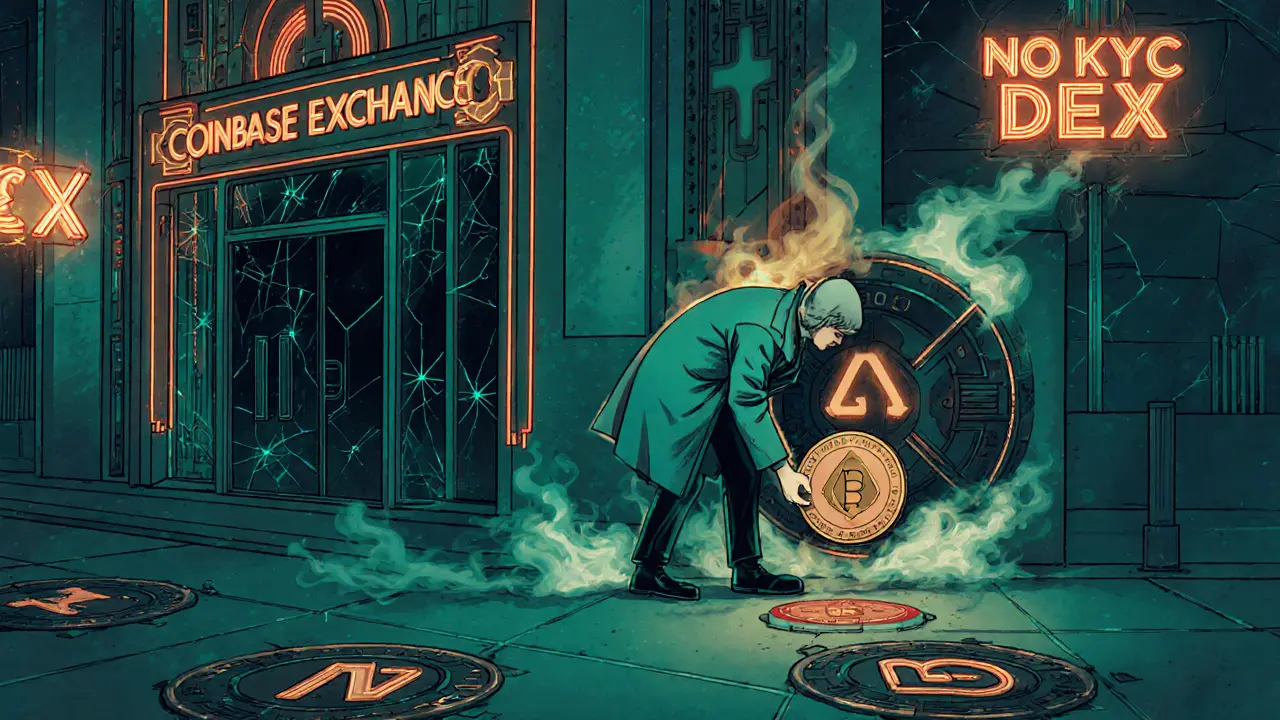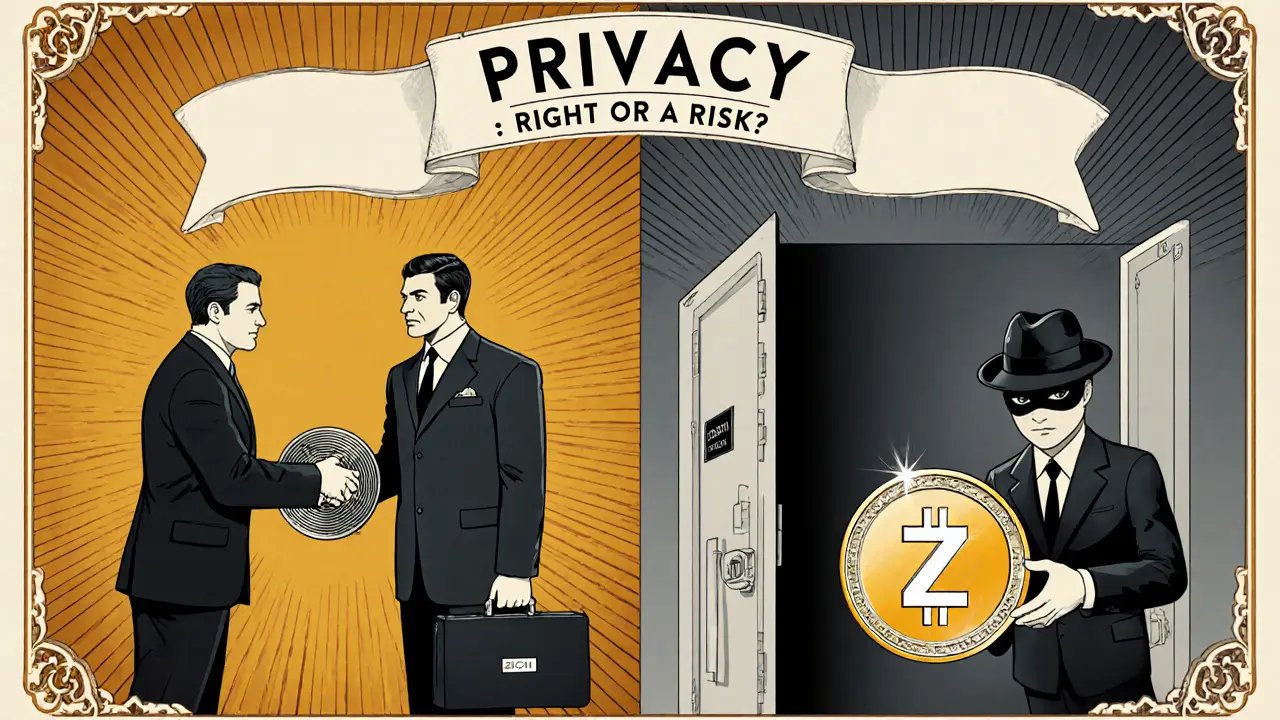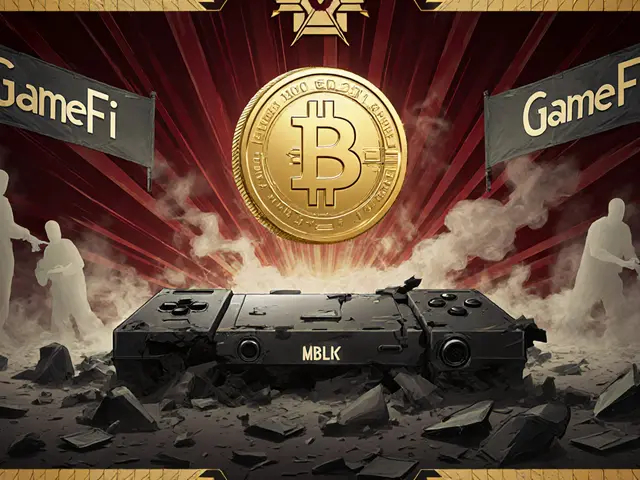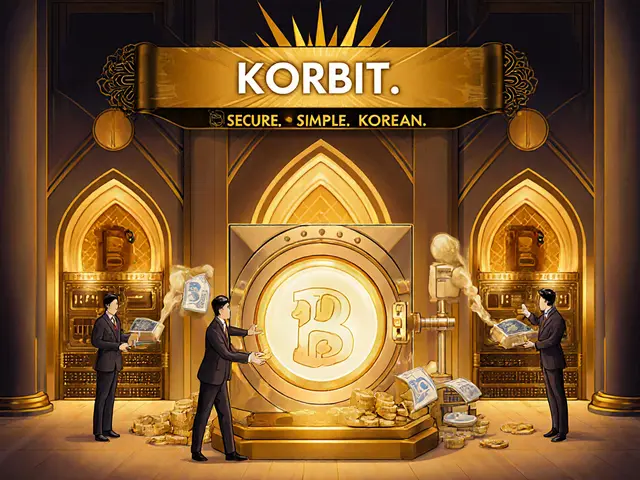Privacy Coin Exchange Availability Checker
Results
Checking...Select your country and coin to see availability
Results will appear here based on your selections
Important Note
Privacy coins are subject to changing regulations. Even if available on DEXs or P2P platforms, they carry regulatory risks. Always research your local laws before trading.
By 2025, if you still hold Monero, Zcash, or Dash on a major exchange like Coinbase or Binance, you might be holding onto something that no longer officially exists on that platform. That’s not speculation-it’s reality. Privacy coins, once seen as cutting-edge tools for financial freedom, are now being systematically removed from centralized exchanges worldwide. Why? Because regulators aren’t asking nicely anymore. They’re demanding traceability. And privacy coins, by design, refuse to give it.
What Are Privacy Coins, Really?
Privacy coins are cryptocurrencies built to hide transaction details. Unlike Bitcoin, where every transfer is visible on a public ledger, privacy coins scramble sender, receiver, and amount data using advanced cryptography. Monero uses ring signatures and stealth addresses to mix your transaction with dozens of others, making it nearly impossible to trace where your coins came from or where they went. Zcash offers a toggle: you can choose between transparent transactions (like Bitcoin) or shielded ones that hide everything. Dash mixes coins through its private send feature, though it’s less secure than Monero or Zcash. These aren’t just technical quirks. They’re intentional design choices. The whole point of privacy coins is to make financial activity untraceable. That’s why they’re popular with journalists in authoritarian countries, whistleblowers, and people living under oppressive regimes. But it’s also why regulators see them as dangerous.Why Are Exchanges Delisting Privacy Coins?
The delisting wave isn’t random. It’s a direct response to global regulatory pressure. The Financial Action Task Force (FATF), the international body that sets anti-money laundering standards, updated its rules in 2019 and doubled down in 2025. Their Travel Rule now requires exchanges to collect and share customer data for any crypto transfer over $1,000. Privacy coins break this rule by design. You can’t trace a Monero transaction. You can’t identify the sender or receiver. So exchanges have two choices: stop listing them or risk fines, license revocations, or criminal charges. In the U.S., the Bank Secrecy Act treats crypto companies as financial institutions. FinCEN enforces this. The SEC and CFTC also weigh in when privacy coins are seen as securities or commodities. In Europe, MiCA regulation is coming into full force. While it doesn’t ban privacy coins yet, the EU has publicly stated it plans to outlaw them by 2027. South Korea and Japan already did. Major exchanges like Kraken, Gemini, and Bitfinex quietly removed Monero and Zcash years ago. By 2025, even smaller platforms are following suit. It’s not about morality. It’s about liability. Exchanges don’t want to be the ones that get fined $50 million because someone used their platform to launder drug money. So they remove the coins that make compliance impossible.Where Can You Still Trade Privacy Coins?
If you want to buy or sell Monero today, you won’t find it on Coinbase. You won’t find it on Robinhood. You’ll need to go elsewhere. That means decentralized exchanges (DEXs) and peer-to-peer platforms. Flashift, SideShift.ai, and ThorChain are now the go-to spots. These platforms don’t require KYC. You don’t need to submit ID. You trade directly from your wallet. But here’s the catch: these platforms are starting to attract regulatory attention too. In 2024, the U.S. Treasury flagged ThorChain for potential violations. Some DEXs now block traffic from high-risk jurisdictions. Others are quietly adding compliance layers-like requiring users to self-certify they’re not using the platform for illegal activity. It’s a gray area. You can still trade, but the space is shrinking. P2P marketplaces like LocalMonero and Paxful are another option. You trade directly with another person, using cash, bank transfers, or even gift cards. But this comes with risks: scams, chargebacks, and no buyer protection. If you’re not careful, you can lose money-or worse, get flagged by authorities.
What’s the Legal Risk for Users?
Owning a privacy coin isn’t illegal in most countries-yet. But holding it can be risky. In the U.S., just possessing Monero isn’t a crime. But if you use it to pay for something tied to illegal activity, you could face charges. In South Korea, simply trading privacy coins is against the law. In the EU, you could be fined or investigated under MiCA’s future provisions. The real danger isn’t the coin itself. It’s the trail. If you buy Monero on a DEX and then send it to a centralized exchange that later gets audited, regulators can still trace your identity through your bank account or IP address. Privacy coins don’t make you invisible. They make your transactions untraceable on-chain. But your off-chain activity-where you bought it, how you funded it, what wallet you used-can still be linked back to you. If you’re using privacy coins for legitimate reasons-like protecting your business negotiations or avoiding surveillance in a repressive country-you’re not alone. But you’re also not protected. There’s no legal shield. No regulatory safe harbor. You’re operating in a gray zone with no rules.Will Privacy Coins Survive?
Some experts say privacy coins are dying. Others say they’re evolving. The truth is somewhere in between. One path forward is integration. Ethereum and other major blockchains are now testing privacy layers-like zk-SNARKs and zero-knowledge rollups-that let users choose when to hide transactions. This hybrid model satisfies regulators: the chain stays transparent, but users get privacy when needed. If this becomes standard, standalone privacy coins could fade into obscurity. Another path is underground survival. Privacy coins could become niche tools for a small, tech-savvy group who accept the risks. Think of them like encrypted messaging apps: not for everyone, but essential for those who need them. Monero’s user base has shrunk on exchanges, but on-chain activity hasn’t dropped. In fact, transaction volume in 2025 is higher than ever, mostly driven by P2P and DEX trading. Institutional investors are watching closely. A few hedge funds and family offices quietly hold Monero as a hedge against financial surveillance. They don’t talk about it publicly, but they’re there. That kind of interest could keep the market alive-even if it’s small.
What Should You Do in 2025?
If you own privacy coins:- Know your local laws. Don’t assume they’re legal just because you haven’t heard otherwise.
- Don’t move them to a centralized exchange unless you’re prepared to lose access.
- Use hardware wallets. Never leave privacy coins on an exchange you don’t control.
- Learn how to use DEXs safely. Mistakes here can cost you your coins-or your freedom.
- Don’t use them for illegal activity. The risk isn’t worth it.
- Ask yourself: Why do I need privacy? Is it for security, or to hide something?
- Understand that liquidity is low. You might not be able to sell when you want to.
- Expect higher fees and slower transactions. Privacy tech isn’t fast or cheap.
- Be ready for future bans. This isn’t a trend-it’s a movement.
The Bigger Picture: Privacy vs. Control
This isn’t just about cryptocurrency. It’s about power. Who gets to see your financial life? Governments? Corporations? Banks? Privacy coins challenge the idea that every transaction must be recorded, tracked, and analyzed. They say: you have a right to financial silence. Regulators say: that silence enables crime. And they’re not wrong. Criminals use privacy coins. But so do journalists, activists, and small business owners trying to survive in unstable economies. The real question isn’t whether privacy coins should exist. It’s whether society can find a way to protect both privacy and accountability. Right now, we’re choosing control. But control has a cost. And that cost is being paid by millions of ordinary people who just want to keep their finances private. Privacy coins aren’t going away. They’re just going underground. And in a world where surveillance is the norm, that might be the only place they can survive.Are privacy coins illegal in the United States?
No, owning or trading privacy coins like Monero or Zcash isn’t illegal in the U.S. as of 2025. However, using them for money laundering, tax evasion, or other illegal activities is a crime. The real issue is that most U.S. exchanges have delisted them because they can’t comply with KYC and AML rules. Holding them isn’t against the law, but using them on regulated platforms is nearly impossible.
Why was Monero delisted from major exchanges?
Monero was delisted because its core technology-ring signatures and stealth addresses-makes transactions completely untraceable. This breaks the FATF’s Travel Rule, which requires exchanges to share customer data for transfers over $1,000. Since exchanges can’t identify who sent or received Monero, they can’t comply with U.S., EU, or South Korean regulations. To avoid legal penalties, exchanges removed it.
Can I still buy Monero in 2025?
Yes, but not on Coinbase, Binance, or Kraken. You can buy Monero on decentralized exchanges like SideShift.ai, Flashift, or ThorChain, or through peer-to-peer platforms like LocalMonero. These don’t require ID, but they come with higher risks: scams, no customer support, and potential future regulation. You’ll also need a compatible wallet like Monero GUI or Cake Wallet.
Is Zcash safer than Monero for compliance?
Zcash offers optional privacy, meaning users can choose between transparent and shielded transactions. This makes it technically more compliant than Monero, which hides everything by default. However, regulators still don’t accept this model. They argue that shielded transactions can be abused, and most exchanges have delisted Zcash anyway. The optional privacy feature hasn’t been enough to satisfy regulators.
What’s the future of privacy coins in 2026 and beyond?
The future is split. One path: privacy features get built into mainstream blockchains like Ethereum, making standalone privacy coins obsolete. The other: privacy coins survive as niche, underground assets used only by those willing to accept legal risk and use decentralized platforms. Some projects may try to add compliance features, but that risks losing their core appeal. Without clear global regulations, privacy coins will remain controversial-and hard to access.




Hamish Britton
November 15, 2025 AT 02:15Been holding Monero since 2018. Didn't buy it to gamble or hide drug cash. Bought it because my freelance clients in Eastern Europe kept demanding bank transfers that got flagged. Now I just use a hardware wallet and DEXs. No drama, no KYC. Just privacy.
Exchanges aren't evil-they're just scared of lawyers. But the real win is that the tech keeps working even when the platforms drop it.
Robert Astel
November 16, 2025 AT 02:06You know what this is really about? It's not about crime, it's about control. We've built this whole digital world where every click, every purchase, every heartbeat is tracked by some algorithm in a server farm in Virginia. Privacy coins are the last flicker of analog soul in a digital dystopia. I mean, if you can't even buy a coffee without the government knowing your spending habits, what's left of freedom? It's not about hiding money-it's about hiding the *self* from the machine. And that's scary for them. Because if you can hide your transactions, you can hide your dissent. And dissent? Dissent is the one thing they can't tolerate.
Also, I think Zcash is kinda sus because why would you make privacy optional? That's like having a secret room in your house but leaving the door open so the cops can peek in. Just sayin'.
ps: i wrote this on my phone so sorry for the typos
Andrew Parker
November 16, 2025 AT 17:08THIS IS THE END OF LIBERTY AS WE KNOW IT.
They're coming for our privacy coins next, then our cash, then our thoughts. I saw a video of a man in Germany getting fined €50,000 for using Monero to pay his neighbor for fixing his fence. FIFTY THOUSAND EUROS FOR A FENCE REPAIR.
What's next? Will we need a permit to own a wallet? Will the IRS send you a notice if your wallet hasn't been used in 90 days?
I'm not crying. I'm just... deeply disappointed in humanity.
😭
Kevin Hayes
November 17, 2025 AT 07:11The regulatory pressure on privacy coins is not irrational-it's systemic. Centralized institutions require traceability to function within legal frameworks. The real question isn't whether privacy coins should exist, but whether society can tolerate financial opacity in an era of algorithmic governance.
Monero's design isn't flawed-it's deliberately antithetical to the architecture of modern finance. That makes it dangerous to power structures, not to society.
The migration to DEXs and P2P isn't a workaround-it's an evolution. And if regulators want to ban privacy, they'll have to ban cryptography itself. Good luck with that.
Katherine Wagner
November 18, 2025 AT 18:52Wait so you're saying privacy is bad? But what about people who don't want their landlord knowing they got a side hustle? Or single moms who need to hide income from abusive exes? Or journalists in places where talking to the wrong person gets you disappeared?
Oh right-those people don't matter. Only the drug dealers do.
And btw, why is it always the poor who get punished for the rich's crimes?
Also I think this whole thing is a scam to push CBDCs.
…
ratheesh chandran
November 19, 2025 AT 18:20Bro in india we cant even buy crypto without aadhar card and pan card and now you talking about monero??
we are lucky if we can buy btc on wazirx without getting our account frozen by rbi
privacy coin? we dont even have privacy in our bank account
we need to fix our own house before we cry about global regulation
also i think all crypto is a ponzi anyway
lol
Hannah Kleyn
November 20, 2025 AT 08:35I've been watching this play out for years. The thing I find weird is how everyone acts like privacy is a new concept. People have been using cash for centuries to avoid scrutiny. The only difference now is that the government can track your cash if you deposit it over $10k.
So we're not losing privacy-we're just moving it from paper to code.
And honestly? I think the people who are loudest about banning privacy coins are the same ones who use offshore accounts and shell companies to avoid taxes.
Anyway, I still hold some Monero. Not because I'm doing anything shady. Just because I believe in the right to be quiet.
Also, I'm not sure if I believe in 'financial freedom' as a concept. But I do believe in not being watched all the time.
And yeah, I know I'm rambling. Sorry.
gary buena
November 22, 2025 AT 06:53So let me get this straight: you're mad that exchanges won't let you trade Monero because it breaks the law... but you're not mad that the law exists?
Also, you're using a phone with a GPS tracker, a microphone, and a camera that's always listening. You're posting this on a platform owned by a company that sells your attention to advertisers. But you're suddenly a privacy warrior?
It's not hypocrisy. It's just... very 2025.
Also, I still use Monero. But I buy it with cash at a gas station in Nebraska. Because if you're gonna be a rebel, at least be a smart one.
Vanshika Bahiya
November 24, 2025 AT 03:02For anyone new to this: if you're holding privacy coins, get a hardware wallet now. Ledger or Trezor. Don't leave them on exchanges. Even if they still list them, they can freeze or delist anytime.
For DEXs, use 1inch or PancakeSwap with a burner wallet. Never link your main wallet. Use Tor or a VPN if you're in a high-risk country.
And if you're in India or the US, check your local laws-some states have started requiring you to report holdings over $10k, even if it's on a DEX.
Privacy doesn't mean recklessness. It means being prepared.
You got this.
Gavin Jones
November 24, 2025 AT 18:53It's fascinating how we've turned financial privacy into a moral issue. One side says: 'It's a human right.' The other says: 'It's a criminal loophole.'
But what if it's neither? What if it's just... technology?
Like fire. Fire can warm your home or burn it down. We don't ban fire. We regulate its use.
Why not do the same with privacy coins? Build a legal framework that allows for shielded transactions under audit, with warrants, with oversight? Not a ban. A balance.
Because if we outlaw privacy, we don't stop crime. We just push it into the dark.
And then we'll wonder why we lost our freedom.
Mauricio Picirillo
November 26, 2025 AT 14:48Just wanna say-thanks for writing this. I've been holding Zcash since 2019. Didn't know half the stuff in this post. Now I'm moving everything to my cold wallet and learning how to use SideShift.ai.
Also, I think we need more posts like this. Not just the hype, not just the fear. Just... facts.
Peace out.
Hamish Britton
November 28, 2025 AT 14:35^ This. Thanks for the kind words.
One last thing: if you're new to DEXs, don't panic if a trade takes 10 minutes. Privacy tech is slow. That's the price.
And if someone DMs you offering 'guaranteed Monero at 20% discount'? Block them. It's a scam.
Stay safe. Stay quiet. Stay free.